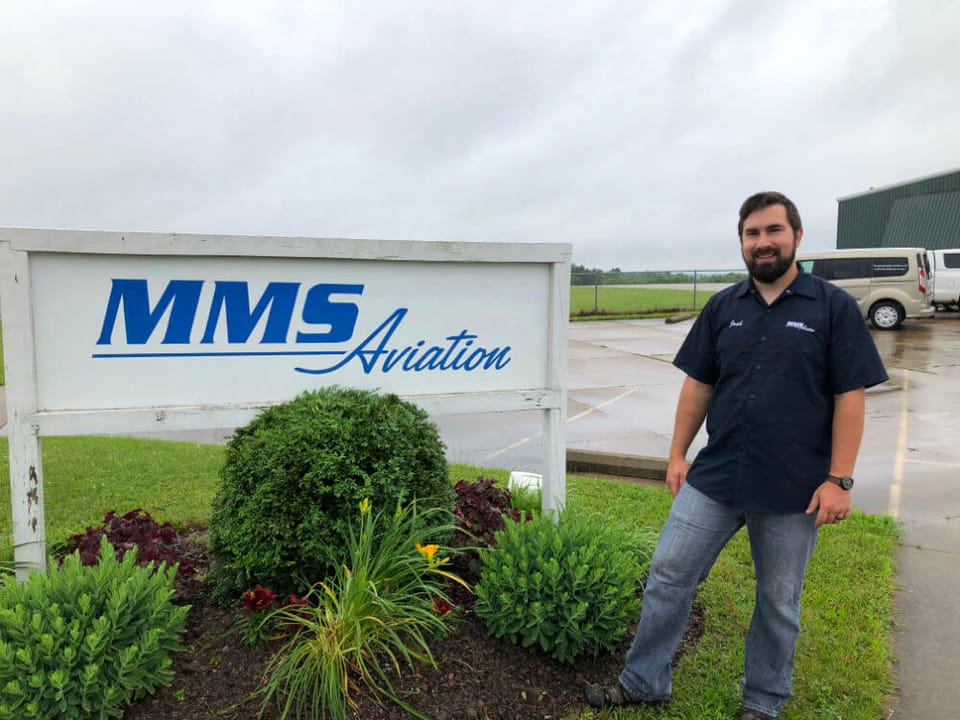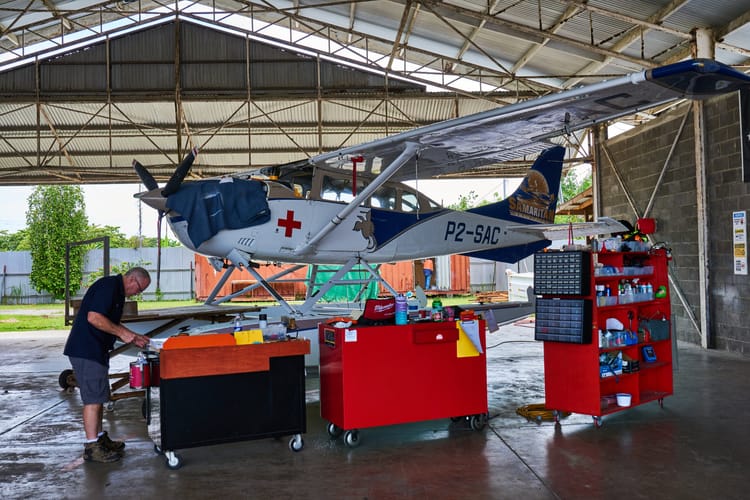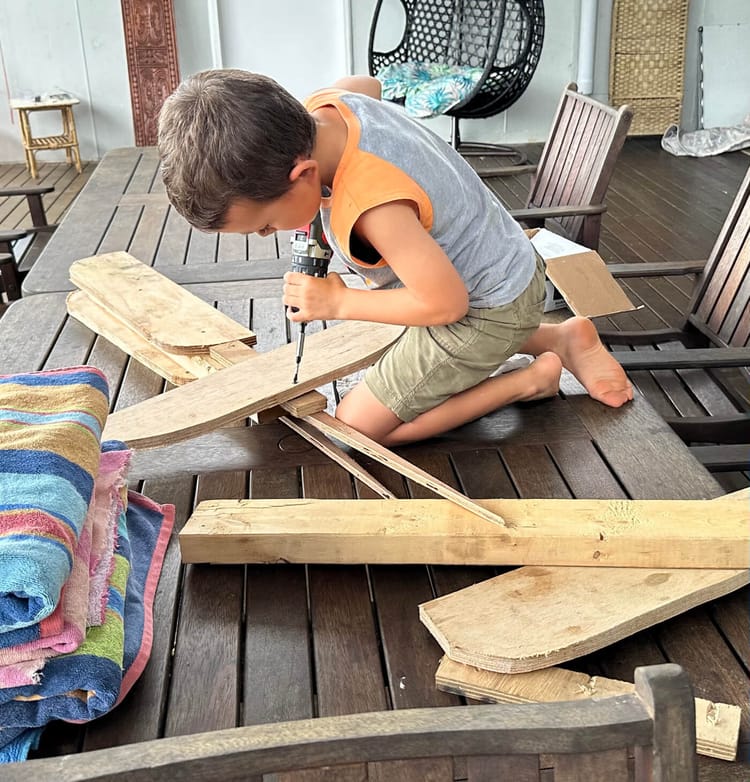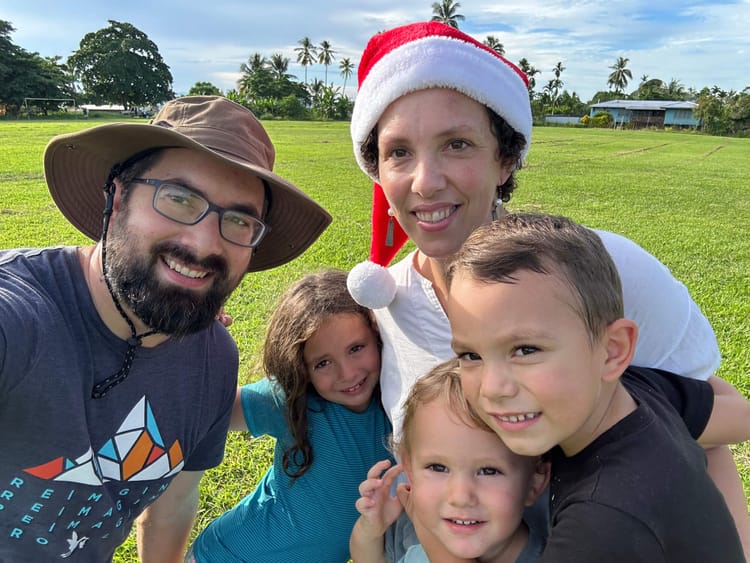Starting My Apprenticeship At MMS Aviation

Settling Into The Hangar
It's been two weeks since I started working in the hangar and so far I've learned a couple things: This is going to be harder than I thought, I've got a lot to learn, and Dave (the safety, maintenance, and all around good guy) only brews Maxwell House in the lunchroom coffee maker. If I want better coffee, I have to bring it in myself. I'm OK with all of that.
First, here's how a normal day looks. I'm supposed to be in the lunchroom for the morning meeting at 7:30 although Dave arrives at 7:00 and starts brewing the coffee. I get there around 7:15 and pour myself a cup for the morning meeting. The meeting involves prayer requests and praises, along with announcements for the day. On Wednesdays we take turns leading a half hour devotional.
After the morning meeting is over, I meet with my project supervisor so we can discuss yesterday's problems, the overall progress of the project, and the goals for the day. Then we get started! Around 4:00 I go to the lunchroom, get out my logbook, and record what I did during the day. This is one way that MMS keeps tabs on what I'm getting experience doing. If I get too much experience stripping paint and not enough working on engines, they'll shift me over to another project so I can gain more experience in another area. It's a great system.
After I get home I study the A&P textbooks for two or three hours and then every Friday I get tested on the chapter that I was assigned. It's a ten question test put together by Bob, the Director of Training, with actual questions that may appear on the A&P knowledge test from the FAA. If I fail, I have to redo that chapter. The study schedule goes on like that for a year and half. They consider you "in training" the first 18 months of your apprenticeship. During the last 12 months MMS expects you to be "in production" meaning you actually get work done and are concentrating on building experience.
There's multiple projects going on in the hangars all at the same time. My project leader right now is Jenny. Yes, girls can work on airplanes too! The project is a Bearhawk from a mission organization that runs an orphanage in Haiti. This plane has multiple discrepancies, or "squawks," that need to be fixed. A squawk is the sound a bird makes when something is wrong. It's also the sound a pilot makes when he complains about something, so it stands to reason that problems which are noticed by a pilot during flight are called "squawks." These squawks are put on record which is called "a squawk list." After a while, the list can get pretty extensive and whoever is in possession of the list starts to think, "Maybe I should get some of this stuff fixed."
The Bearhawk is in our hangar to get it's squawk list, or discrepancies, fixed.

One of the problems with the airplane, the pilot noted, was that the engine ran hotter than it should. Once the engine cowling was removed the problem became evident: The engine bay was full of mud! That's a strange problem to have. There was also a hornet's nest between one of the cylinders!
Welcome to mission aviation, I guess.
The Bearhawk has aluminum covered wings but a fabric covered fuselage and control surfaces. The fabric had holes in it and was nearing the end of its lifespan. It was time to replace it! So my job, being the new guy, was to strip the old fabric off of the frames and then clean off the glue that held it on. This is harder than it sounds.
I assumed before I started that working on airplanes is meticulous, detail oriented, and time consuming but now I'm realizing how true that is. I have to get a pick and scrape the paint out from between every rivet head in the aileron and flap. There's hundreds of rivets!

We were using an environmentally friendly paint stripper and we were struggling to get the glue off of the frames. Then one of the long-time volunteers who was helping me mentioned something called "El Dorado."
"It makes your eyes water and it burns like crazy when you get it on you but it works better than this stuff does."
I was interested. Soon we needed more stripper and I suggested we get some of the El Dorado stuff. All parties involved thought it was a good idea. We put on our safety glasses and yanked on our rubber gloves. When you use rubber gloves in a hot hangar, your hands start smelling like feet - which is unpleasant. I wondered if gloves were really necessary. Then I got some El Dorado splattered on my legs. "Hmm..." I thought, "that doesn't burn at all." About ten seconds later I was yipping around the hangar like a hyena who stepped on a snake. They were right, El Dorado does work well.
I suggested that we could just sandblast everything. I was informed that airplanes are generally made from an aluminum alloy that is sandwiched with two thin layers of pure aluminum for corrosion resistance. Sand blasting would rip off the soft layer of pure aluminum and damage the material. It needed to be hand cleaned, that's just the way it was. I feel like I'm a bull in a China shop training to become a ballerina. It's a tough transition.
MMS Aviation doesn't just offer an apprenticeship program, they also allow staff from other organizations to come for short term internships just so they can get more experience. In the three weeks since I've been working here, I met Ritah, who is with Samaritan's Purse in Kenya, Tim, who is from Switzerland and is involved in Mozambique with Mercy Air, and a Mark, a dude from Canada who's working on getting his U.S. citizenship so it opens more serving opportunities.
Settling Into Our New Home
Meanwhile, at home Janice is busy trying to rid the house of pests. Since our rental is an old farm house with a drafty basement, spiders are running amuck. We just ordered two gallons of spider spray and are planning on sanctifying the basement of our house with maximum judgement and minimum grace.
The other night Janice found two raccoons on our deck and tried to chase them off with a broom. She repeatedly whacked the big one right between the eyes. It yawned, took a step back, and chuckled. Janice retreated to the house, angry and determined. "What's the biggest gun you have?" she asked me. I raised an eyebrow and whistled, suddenly feeling very attracted to my wife.
Mowing the yard is proving to be difficult. We are borrowing a zero turn mower from the in-laws because they still haven't found a farm to call their own. We graciously offered to babysit the poor mower so it didn't have to sit all lonely and scared in a barn somewhere. The problem is that our yard is built on a ski slope. You have to estimate your trajectory, drive over the brink, and try to skid in a straight line while the rushing wind makes your lips are flap around your ears. Then you have to drive around the bottom of the yard to get back up to the top since you can't just go straight up the hill.
Thank you for praying for us as we start this new adventure!





